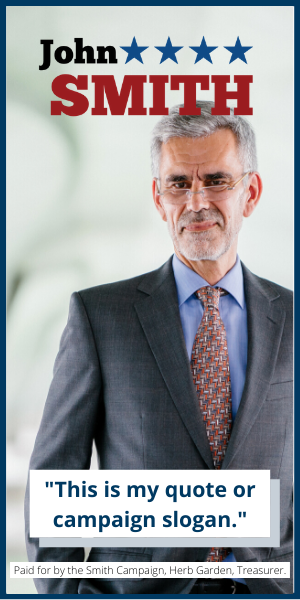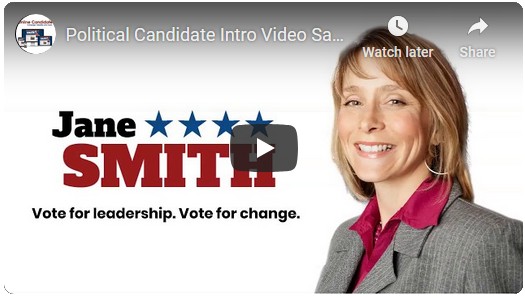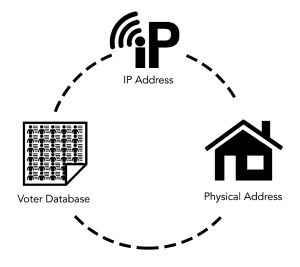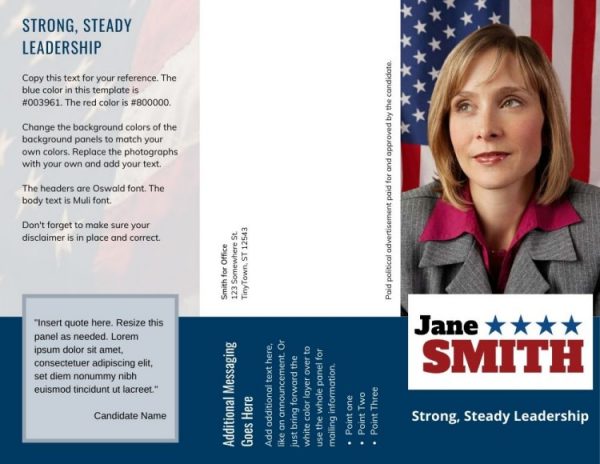Political Web Services
Your website is the foundation of a successful online political campaign. Many candidates turn to local web developers or ‘free site builders’ for their political campaign website design needs. Neither has the experience or expertise in digital politics. That can mean that your development project costs more money and time than it should. Those are resources best invested toward campaign activities.
Web Services for Political Campaigns
We provide a variety of political website services to help new and established candidates win elections since 2004. We’ve built and launched political campaign websites long before digital became an essential marketing component of down-ballot races. Messaging, content and technical requirements all play a critical part in success.
Our political clients include mayor and city council representatives, judges, sheriffs, school board candidates, political committees, grassroots organizations to state and congressional candidates.

We help campaigns succeed online in a variety of ways:
Campaign Design and Branding
Our Custom Site Packages include logo design to grab attention and identity you to voters. The colors, font and layout all help create a foundation for a narrative on which to build your brand. The graphics we create can be provided in high-resolution for print use in brochures and mailings.
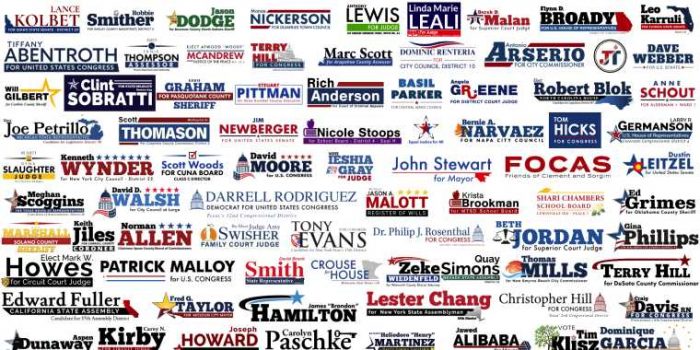
Slogans we’ve created for clients.
An Easy to Use Content Management System
We’ve worked to make our content management systems easy to use for non-technical users. You don’t need to know how to program or edit complicated building blocks. You can add and edit page content, images and post news and updates. If you can use Microsoft Word, you can use our system. Check out our Site Demo to see how the system works.
Digital Marketing Services
We offer a number of online marketing services to help launch your digital presence, including video design, social media account setup, and IP targeting. Online campaigning is constantly changing and expanding. We help our clients keep up with the best practices.
Resources and Tools for Candidates
Find just the right image for your page or post in our built-in image library. Clients also have access to additional tools, articles and resources. Use our social media and print templates to help promote online and offline.
An Investment In Your Political Campaign
The best political campaign websites are appealing, inform voters, and help visitors take action. Our system includes the pages, forms and layout (desktop and mobile-friendly, of course) to help get a jump start on content so you can launch your site quickly and without hassle. A sample of the features include:
- Domain and Hosting: A free .com domain name is included. We take care of all your hosting needs. It’s all set up automatically.
- Built in styles and Templates: Built-in page layout styles and professionally-designed color schemes are included, along with ability to easily embed YouTube videos, audio files and presentations.
- Powerful Page Editor: Make unlimited edits. Easily add, edit and update your site content. Add image popups, sliders, buttons, and even text-to-Tweet links. Plus, it’s easy to make your pages SEO-friendly so they appear in relevant searches.
- Accept Online Donations: Any outside fundraising system or service can be integrated to accept contributions and donations.
- Forms and Data Capture: Capture and download data from your contact, endorsement and event forms.
- Social Media Integration: Easily display your Facebook and Twitter feeds in your sidebar or in your pages. Visitors can share your content to their own friends and followers.
- Other Built-in Tools: Includes an event calendar, popover messaging, countdown widget and more to help win your election.
- Technical Support: Get help through our extensive knowledge base, by trouble ticket or phone.
- Up-Front Pricing: All of our services are spelled out clearly and have fixed prices to make it simple.
Frequently Asked Questions
How did you start in this niche?
Our first experience in politics goes back twenty years ago, when we employed online tactics to help a local candidate win her election. We created a campaign website for the candidate, which forced her opponent to spend thousands in developing a competing site. We also helped promote positive search results for the candidate and negative search results for her opponent. In the end, we won!
What are the benefits of using Online Candidate?
There are many benefits to Online Candidate. One of the most important, as expressed by our clients, is that you are actually dealing directly with the person who is doing the work. Our system is flexible for various needs, so you are free to work with and integrate other vendor services. We also focus exclusively on political websites, so our process is streamlined an efficient, allow us to pass along the cost savings.
We offer a variety of site packages and related marketing services. What services are best for you?
Local Election Laws And Your Campaign Website
Although the web is often considered a freewheeling environment, local election laws still apply to online political campaigning. As a candidate, it’s essential to know what local election laws apply online before you start your digital campaign.
Common legal topics facing local political campaigns:
 When can a candidate start political campaigning?
When can a candidate start political campaigning?
Some municipalities have restrictions on when you can actively start campaigning. Some local laws are more restrictive than others – especially for judicial campaigns. Even if you have to wait, many clients prepare ahead of time. They may reserve a domain name and get their website ready to go in anticipation of the time that they can go ‘live’ with it.
Required political website disclaimers
Your campaign website may need to have various disclaimers or certain verbiage in your website footer text or elsewhere on your site. Generally, this would match the election law disclaimer requirements of your print materials. This copy is typically something along the lines of, “Paid for by …” In fact, all online ads these days require disclaimers and advertiser verification before they are even run.
Restrictions on what can appear on a campaign website
There may be restrictions on the use of state flags or state seals in the design. (We’re looking at you, Florida!) They may be additional restrictions as to whether you can appear in uniform in campaign materials. This comes up fairly often in law enforcement and sheriff campaigns.
Rules for logos
It was recently pointed out to us that according to Texas state law , in a “for” Sheriff logo the “for” text has to be at least 50% as large as the Sheriff. If it’s any smaller, you can get in trouble with the Texas Ethics Commission.
What a candidate can say on a website
We’ve had to change a few client’s site header designs after they’ve discovered that they cannot use certain phrases or words. In one case, we had to remove the word ‘Elect’ from the header because the election laws for the position did not allow for that word to be used. You may want to watch how your copy and signage reads so it does not give the impression that the new position you are running for is a position you already hold.
How local campaigns can contact voters
With the increase in texting, robocalls and phone banks, there are still rules that political campaigns must follow. In 2020, congress passed the TRACED Act to combat illegal robocalls. It increased potential fines and added additional tools for regulators to combat spam calls and texts.
For example, calls to cell phones are prohibited unless the recipient has explicitly opted-in to receive campaign updates. The message itself must identify the candidate and party for whom call is made. A contact number and address must also be included at the end of the message. Your state may have additional rules and requirements. You’ll want to check into them before you fire up the robodialer.
Campaign finance limits
Be sure not to exceed your local campaign contribution limits. Your donation page should be configured to reject donations that exceed your limit. Additional donor information may also be required. This can include, but is not limited to: donor’s occupation, spouses name, citizenship requirements and so on.
Invoicing for internet services
If you pay for an online service, you should keep records of your expenses, just as you would for anything else related to your campaign. (Online Candidate clients can log into their Client Portal and download financials.)
Become familiar with your local campaign election laws before you start actively campaigning. Getting caught breaking the rules – even seemingly innocent ones – in the middle of an election can be embarrassing and an unnecessary distraction.
A good rule of thumb is that if something is not allowed in print, you can bet it won’t be allowed on the web. You can be sure that an opponent will use any violations as an attack point. Just stick to the letter and the spirit of the law, and you should have no problems at all.
Legally, at least.
Learn more about our Political Website Packages and marketing services to create an effective, professional web presence.
What Political Campaigns Need To Know About Google Display Ads
Have you noticed more and more political campaign ads on your news and email websites? Ever wonder how they get there?
They are called display ads. Large campaigns use them. But they can also be part of your own political campaign strategy to reach voters online.
Unlike traditional pay per click (PPC) advertising, display ads are not based on user searches. Rather, the graphic (image) ads appear at the top, on the side, and in the middle of web content where a user is browsing. Display ads show on the Google Display Network. The GDN includes a network of websites, videos, and apps that reach 90% of internet users on any particular day.
Your ads can appear where a user is reading news articles, checking email or watching online videos.
They may look like this:

468×60 pixel banner ad.
or this:

Display ads give you control over your branding. This differs from traditional Google Search Ads, where the ads are text-based, with just text copy for the headlines and descriptions.
Per Google’s restricted targeting for election ads, only the following criteria may be used to target election ads:
- Geographic location (except radius around a location)
- Age, gender
- Contextual targeting options such as: ad placements, topics, keywords against sites, apps, pages and videos
Political content includes ads for political organizations, political parties, political issue advocacy or fundraising, and individual candidates and politicians.
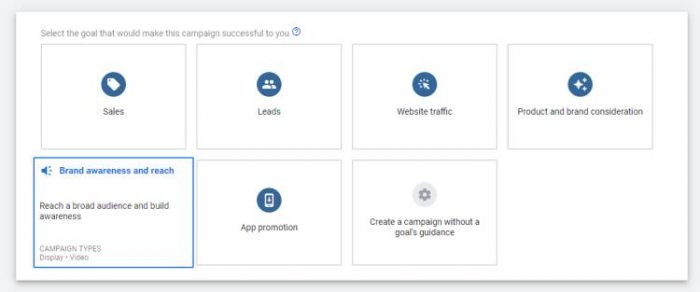
There are two types of Google display ads: uploaded and responsive. Uploaded ads are created by the advertiser. Responsive ads are created by uploading your logo, some visual assets (images and videos) and display text. From there, Google Ads will test different combinations of visuals and copy to determine which versions of your ad perform best. Responsive display ads also automatically adjust themselves to meet the requirements of specific web pages.
Ads can link to your website home page or to a particular landing page. Try to make the landing page of any ad relevant to the ad itself. For example, if you are running display ads about a particular issue or ballot measure, have the landing page be about that issue, rather than to your website’s home page. Donation pages also make for good landing pages.
Here are graphical display ad samples
In case you were wondering what display ads look like, here are some samples. Best design practices include:
- Having a solid border around the ad
- A head shot to make the image more visually attracting
- A political disclaimer.
Sample political display ads:
These images sizes are standard for other types of online advertising, such as IP targeting, website retargeting and website advertising (such as newspaper websites.)
How display advertising works for political campaigns
There are several ways you can target voters using Google display ads. The most common method is retargeting, where you target ads to people who have visit your website – even to specific pages. This only works if you have a large amount of site traffic.
Running a Google Display Ad (GDA) campaign is a little different than an IP Targeting campaign.
- Both use the same types of creatives and ad sizes.
- Both can target people who have not visited your website.
- GDA can only target general geographic locations, possibly narrowed by age and gender. It’s more of a shotgun approach, where you reach both active and non-active voters.
- IP Targeting targets specific physical addresses that you choose, which is why it is more expensive on a cost per thousand impressions.
Again, Google has limited political ads to be fairly generic in their reach. Many of these restrictions followed the 2016 US presidential elections. The costs are generally less than IP Targeting ads and even traditional Pay Per Click advertising, which is based on keyword searches.
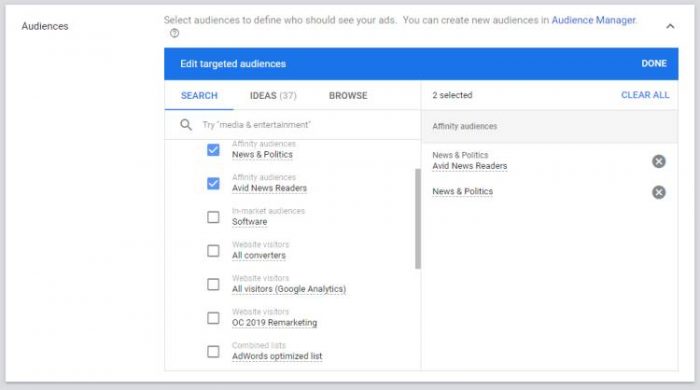
Display ads are great for building awareness for your political campaign or cause. They can be bought on both a cost per impression and through pay per click search models. Voters may not be actively searching for you or your campaign, but running display ads allow you to introduce your campaign to those who may not have been exposed to your campaign otherwise.
Don’t forget about verification
Before you start an election display ad campaign, you should know that any individual or organization that purchases an election ad on Google or YouTube must provide information to Google confirming that they are a U.S. citizen or lawful permanent resident. Google also requires all political ads to display a ‘paid for’ disclosure.
This verification process can take time, so you’ll want to start the process as early as possible.
Also, changes in the Display Network can take 12-24 hours to apply and may not show right away. Keep this in mind while creating a new campaign or making changes to an existing campaign. You may want to set up your campaign a few days before the launch and set the start date in the future. And don’t forget to add an end date on Election Day!
Google display ads can be exceptionally powerful for both large and local political campaigns. They are a great way to expand your exposure to the electorate.
Related:
Don’t Distance Your Campaign From Voters
These are uncharted times for down-ballot campaigns. With in-person contact limited, candidates are reaching voters through digital marketing.
Online Candidate is here to help. From our articles to our campaign resource site to our marketing services, we help campaigns of all types build their digital presence.
If you are running for office this year, you need to start your online campaign!
Start With a Campaign Website
A campaign website isn’t an option this year. From our $29 Monthly Option (6 Months for $149)to our Enhanced Website Package, our design and online marketing services make creating your online presence the easiest part of your campaign.
Which Package Is Best For You?

Political Promotional Videos
Need to kick off your YouTube channel? Let us create an intro video branded with your campaign and messaging. It’s a quick and affordable way to start another online promotional channel.
Learn More About Our Video Promos

Target Your Voter List By Address
By matching physical addresses, IP Targeting is your way to reach specific voter households. Your ads can display on news sites, email portals and other popular sites across the web…
Learn More about IP Targeting
Digital Download Store
We carry a large range of digital downloadable items to help campaigns and organizations. It features a variety of campaign e-books, political print templates and political logo templates available for immediate download.
Visit the Download Store
One-on-One Consulting
With the shift to online campaigning in 2020, even local candidates must learn the ins and outs of online campaigning. To help candidates get the most from their online efforts, we now offer personalized, one-on-one consulting services.
Book a One-on-one Session
For Political Campaigns, Summertime Is No Time For A Vacation
Despite everything that is going on in the world today, primary and general elections are still on their way. Even if it’s summertime, it’s no time for a vacation. Political campaigns of all types need to get organized and fired up.
This is especially true for local campaigns. They often tend to do less as members of the team take vacations and do family activities during the warm weather. One way to motivate yourself and your colleagues is to hold a “summer kickoff” event: This could be as simple as having everyone bring their families out and have a picnic.
It’s important to keep in contact with your organization. During the summer months, it’s easy to let things slip and assume you will pick things up around Labor Day. This is an election year like no other. Candidates and organizations must adapt to the changing nature of offline and online campaigning.
As we head into the summer months, we’ve put together a selection of articles to help kick off your campaign.
- Opening a Bank Account For Your Political Campaign
Raising money and managing expenses is an critical part of the election process. Opening a campaign bank account is a first step in establishing a viable political campaign. - Political Website Domains and Hosting – What To Know
This free guide provides an overview on the basics of domain name registration and website hosting for political campaigns. - Digital Marketing Ideas For Political Campaigns
Some campaign marketing strategies are affordable, others are more expensive. Here are some of the most popular online advertising options available today. - 5 Online Ways To Connect With Voters
Here are five things your campaign can do right now to connect with voters during this uncertain time. - Using Facebook Live for Your Political Campaign
For local political candidates, the shift from door-to-door canvassing and in-person fundraising events to online-only campaigning has been particularly jarring. Now video is more important than ever… - Online Candidate Quickstart Guide
Get pre-order answers, campaign website setup information, launch tips, and options for your site. - Listen Up! It’s Our Running For Office Podcast
Download and listen to our podcast series, Running for Office as an Online Candidate. - One-On-One Consultation for Your Political Campaign
We now offer personalized, one-on-one consulting sessions to help you with your digital campaign.
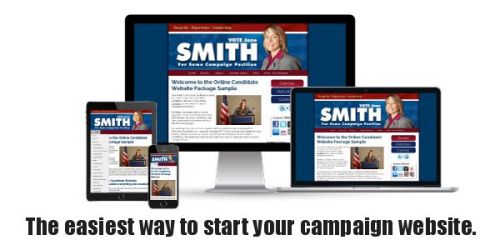 Don’t wait! With our affordable political website packages, you can start your online campaign today. Backed by easy to use tools and exclusive resources, we help hundreds of campaigns WIN every election cycle.
Don’t wait! With our affordable political website packages, you can start your online campaign today. Backed by easy to use tools and exclusive resources, we help hundreds of campaigns WIN every election cycle.
Using Facebook Live for Your Political Campaign
Reaching voters online is more important than ever. For local political candidates, the 2020 shift from door-to-door canvassing and in-person fundraising events to online-only campaigning has been particularly jarring.
Candidates with little online experience shifted to social media, email and online fundraising. And now video is more important than ever. Campaigns are using video to reach voters and to support their volunteer and fundraising efforts.
Creating video today is easier than ever. Anyone with a smart phone can record and even edit video on the go. Live-streaming is more popular than ever as people across the country stay at home. While the recent pandemic has prevented in-person events, virtual events have become more popular through services like Facebook Live.
What is Facebook Live – and how can it help political candidates?
profile, a Page, group or even an event. Viewers can watch from their computer, mobile phone or other connected devices. allows candidates to speak and engage directly to their audience.
If you have ever done a video chat with friends or family through Facebook then you have already used Facebook Live. However, campaign broadcasting is not typically as casual as personal communication.
You can use Facebook Live to record and stream a variety of campaign-related material. It’s not particularly difficult, and you don’t need a full studio setup. In many cases, you can use your mobile phone to broadcast.
In this article we will explore how Facebook Live can help your digital marketing strategy.
Setting up Facebook Live for campaigns
You can either stream at a particular time or schedule a time for a live stream. There are plenty of topics for creating live videos:
- Campaign events, rallies and fundraisers.
- Canvassing activities.
- Participation at public meetings or legislative sessions.
- Behind the scenes of the campaign.
- Personal candidate updates.
- Reminders/Get out the vote.
One advantage of a live video (or any online video) is that you are not limited to the standard 6, 15 or 30-second ad. The longer a live video lasts, the more opportunity there is for others to join in and engage with the content. The time limit for a live video session on Facebook is 8 hours. That should be more than enough time for any event you decide to broadcast.
Facebook Live videos often seem spontaneous, but for best results you’ll want to plan each broadcast. Randomly filming a canvassing walk might not be interesting. But if you have a topic to discuss or something interesting to show, that will give your broadcast a purpose. You might not need a script, but you should have an idea of what’s going to happen before you turn on the camera.

You can always broadcast on the spot, or you can schedule live videos ahead of time. Announcing your broadcasts ahead of time helps build anticipation and buzz. Posting upcoming announcements to your social media accounts. Also notify your email subscribers and website visitors. Build anticipation for your events to encourage more viewers.
When you create a live event from your page, group or profile, you have many options. You can either go live immediately or schedule your video for a later time. The more information you include when you set up your event, the better. You’ll want to add a descriptive name and location, any special guests and a call to action. This might be to have viewers follow you on social media, volunteer to help or donate. If you have a poll or questions to add, you can do this when you set up your live post.
You only have a few seconds at best to catch someone’s attention before they scroll past your video. An interesting title and image will help draw eyeballs.
Live video broadcasting tips
If you have never done Facebook video broadcasting, take the time to learn the settings and options available to you. Facebook continually updates their platform and features.
- Make a few practice recordings to get used to speaking in front of a camera. Learn to be yourself while recording.
- Keep your videos (and other types of posts) short and to the point. Users scrolling through their feed aren’t going to spend a lot of time on long posts or videos.
- Place and settings are important. Choose a proper location that is not too busy or too loud. How you compose your shots is also important. For example, placing your subject one third to the left or right is more visually interesting than having the the subject in the center of the frame.
- Proper lighting is required, especially if you are recording indoors. You may want to add artificial lighting from one or more sources.
- Consider using good clip-on microphones. Poor audio can provide a worse experience for viewers than even low-resolution video.
- Run a quick trial video before your event and play it back to make sure everything is working properly. There is nothing worse than starting a video and finding out after a few minutes that your audience cannot hear or see you.
- Before you go live, make sure your internet connection is solid. You don’t want to get dropped in the middle of your recording. Depending on your settings, an unexpected drop-off could terminate your live video event.
- If you decide promote issue, electoral or political content, you will need to be authorized for advertising first.
Use Insights to learn what works – and what doesn’t
You can check your stats and feedback to see what your content audience engages with the most. You don’t want to become repetitious, but you will probably find that certain topics or video types tend to do better than others. You can find this information in the Insights tab of your Facebook page. These analytics provide a wealth of data. In time, you can use these insights to determine the best times to post or broadcast, how many people you reach, and what posts provide the most interactions.
Facebook Live videos produce 6 times as many interactions as traditional videos. Finding out what resonates can help you improve your content. Just be careful not to take it too seriously. Just because something tends to do well doesn’t mean that doing over and over will give you the same results.
After your online video event…
Once your live stream broadcast is finished, your video is automatically posted to your timeline and saved to your Facebook video library. From there, it can be viewed by others in the future. You can also download your video to your computer.
You can edit your downloaded video to tighten it up and add an intro and outro (beginning and end branding clips). Then you can upload your edited video to your campaign’s YouTube account and embed it into your campaign website. For more control over your embedded videos, consider using a paid video hosting platform like Wistia or Vimeo.
Ready to get started? Lights … camera … stream!
Need help setting up your campaign Facebook page? Add our Social Media Setup addon to your Online Candidate campaign website package.
Related Facebook Articles:






